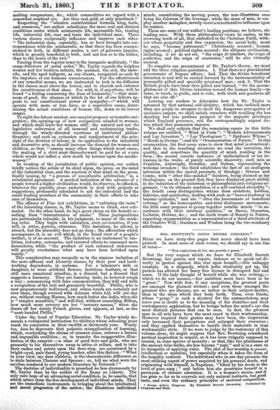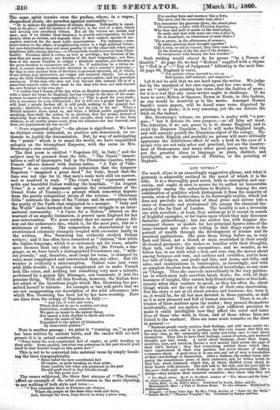MRS. BROWNING'S SONGS BEFORE CONGRESS. * HERE we have sixty-five pages
that never should have been printed. In most cases of such verses, we: should say in one line of verse- " Non ragioniam di lor, ma guarda e pease."
But the very respect which we have for Elizabeth Barrett Browning, her genius and repute, induces us to speak out di- rectly in protest against this slur upon herself,—this unhappy example. In a rhapsody, which looks studiously got up, the poetess has allowed her fancy free licence to disregard fact and sense. If the lady thought of herself while she was writing,— which we do not assume,—her ambition must have been to be "great." Now with few, if any exceptions, the greatest poets are amongst the plainest writers ; and even those amongst the greatest who are obscure are so rather in their subject-matter, than in the ideas which they body forth. Thus, even Dante, whose " gergo " is such a mystery for the commentators, may leave you in doubt as to the meaning of his diatribes and their contemporary application but he brings before the mind's eye the most distinct pictures dud can be seen. In fact, the greatest men in all arts have been the most exact in their workmanship. However inspired their genius may have been, the inspiration only increased their perceptions and enlarged their resources ; and they applied themselves to handle their materials in true workmanlike style. If we were to judge by the testimony of this volume alone, we might suppose that Mrs. Browning considered poetical inspiration to consist, as it has been vulgarly supposed to consist, in some species of insanity ; so that, like the priestesses of the ancient false faiths, she has become "rapt," and is in a state to be incapable of applying rules. The idol of her worship is power, intellectual or material, but especially when it takes the form of the tangibly realized. The individual who in our day presents the most striking aspect of power acquired by his personal deeds, and originating with himself, is Napoleon, "lifted by his deeds to the level of pure song ; " and before him she prostrates herself in a paroxysm of chronic adoration. It is a woman's mania, and it has gone so far as to overrule not only natural instincts, but good taste, and even the ordinary principles of metrical composition.
Chapman and anbd u eforaue .Congres8. By Elizabeth Barrett Browning. Published by
The same spirit invades even the preface, where, in a vague, rhapsodical strain, she preaches against nationality :—
" Or to enlarge the significance of certain things. Nationality is excel- lent in its place ; and the instinct of self-love is the root of a man, which will develop into sacrificial virtues. But all the virtues are means and uses ; and, if we hinder their tendency to growth and expansion, we both destroy them as virtues, and degrade them to that rankest species of cor- ruption reserved for the most noble organizations. For instanoe,—non- intervention in the affairs of neighbouring states is a high political virtue; but non-intervention does not mean passing by on the other aide when your neighbour falls among thieves,—or Phariseeism would recoverit from Chris- tianity. Freedom itself is virtue, as well as privilege; but freedom of the seas does not mean piracy, nor freedom of the land brigandage ; nor free- dom of the senate from to cudgel a dissident member, nor freedom of the press freedom to calumniate and lie. So, if patriotism be a virtue in- deed, it cannot mean an exclusive devotion to one's country's interests,— for that is only another form of devotion to personal interests, all of which, if not driven past themselves, are vulgar and immoral objects. Let us put away the little Pedlingtonism unworthy of a great nation, and too .prevalent among us. If the man who does not look beyond this natural life is of a somewhat narrow order, what must be the man who does not look beyond his own frontier or his own sea ?
"I confess that I dream of the day when an English statesman shall arise with a heart too large for England, having courage in the face of his coun-
trymen to assert of some suggested policy This is good for your trade ; this is necessary for your domination ; but it will vex a people hard by ; it will hurt a people farther off; it will profit nothing to the general hu- manity; therefore, away with it !—it is not for you or for me.' When a British minister dares speak so, and when a British public applauds him speaking, then shall the nation be so glorious, that her praise, instead of exploding from within, from loud civic mouths, shall come to her from without, as all worthy praise must, from the alliances she has fostered, and from the populations she has saved."
"Sonic suggested policy "—the phrase is significant. We have no distinct events indicated, no positive acts denounced, no ra- tionale to justify the denunciation. Bat, by way of anticipating the " praise " which is to mend the world, we have unqualified eulogies on the triumphant Emperor, with the curse on Mrs. Browning's own country.
The first poem is entitled "Napoleon III. in Italy," and the subject may be guessed from the title. "The Dance" immor- talizes a sort of impromptu ball in the Florentine Cascine, where French officers danced with Italian ladies. "A Tale of Villa- franca" is an extremely obscure intimation that the Emperor Napoleon "imagined a great deed" for Italy, found that the time was not ripe for it, that men's souls were still too narrow, and so resolved to wait. "The Court Lady" represents some noble and beautiful Italian walking the hospitals. "An August Voice" is a sort of argument against the reinstitution of the Grand Duke of Tuscany,—a precept which somewhat departs from the purely eulogistical strain of the volume. "Christmas Gifts" contrasts the state of the Vatican and its corruptions with the purity of the Faith that originated in a manger. "Italy and the World" looks forward from the present struggle to an inter- national community. "A Curse for a Nation," uttered on the warrant of an angelic intimation, is poured upon England for her non-intervention. We must confess that we cannot always fol- low out the authoress's idea, which is, for the most part, lost in a wilderness of words. The composition is characterized by an overstrained solemnity strangely coupled with excessive laxity in the writing. Mrs. Browning has evidently studied Italian writers ; and it has often been remarked as "curious," that while the Italian language, which is so extremely apt for verse, admits more licences than any other in its poetry, the French, a lan- guage, as we have heard a distinguished Frenchman say, " with- out prosody," and, therefore, most inapt for verse, is cramped by rules more complicated and constrained than any other. But the wonder is evidently a misconception. Italian runs into verse with little trouble ; it requires complicated art to make French look hie verse, and nothing but something very near a miracle, performed by a genius 1Bre Berang, er, can transmute it into the genuine thing. With all this freedom, however, the Italian does not admit of the licentious jingle which Mrs. Browning has per- mitted herself to tolerate. An example or two will prove that we are not exaggerating our description of the wild utterances into which Mrs. Browning has been led by her hero-worship. Here are lines from the eulogy of Napoleon in Italy :—
" And yet, 0 voice and verse,
Which God set in mete acclaim and sing Conviction, exaltation, aspiration, We gave no music to the patent thing, Nor spared a holy rhythm to throb and swim About the name of him Translated to the sphere of thimination By democratic passion !"
Here is another passage ; we print it "running on," as poetry has been written by ancient bards, and the reader will see how prosaic it is in actual construction.
"Some hated the new-constituted fact of empire, as pride treading on their pride. Some quailed, lest what was poisonous in the past should graft itself in that Druidic bough on this green now."
This is not to be converted into metrical verse by simply break- ing the lines typographically.
"borne hated the new-constituted fact Of empire, as pride treading on their pride. Some quailed, lest what was poisonous in the past Should graft itself in that Druidic bough On this green now."
The verses subjoined, the three first stanzas of "The Dance," afford an example of the utter carelessness in the mere rhyming, to say nothing of both style and verse :— " You remember down at Florence our Cascine,
Where the people on the feast-days walk and drive,
And, through the trees, long-drawn in many a green way, O'er-roofing hum and murmur like a hive, The river and the mountains look alive ? You remember the piazzone there, the stand-place Of carriages, a-brim with Florence beauties, Who lean and melt to music as the band plays, Or smile and chat with some one who a-foot is, Or on horseback, in observance of male duties ?
'Tis so pretty, in the afternoons of summer,
So many gracious faces brought together !
Call it rout, or call it concert, they have come here,
In the floating of the fan and of the feather, To reciprocate with beauty the fine weather."
Such writing would almost do for poems "by a Person of Quality." At page 60, we find "Modena" supplied with a rhyme by "God in a"—" Day of Judgment" following in the next line. At page 60, England is ourst, "For patriot virtue starved to vice on Self-praise, self-interest, and suspicion."
Let it not be said that we are hard upon the writer. We judge her by the standard of her own repute, and her own work. Nor are we "unfair" in printing her verse after the fashion of prose ; for it is a test that any verse-writer ought to challenge. If we were to serve Milton or Spenser, Byron or Keats, in this fashion, no one would be deceived as to the metre. Amongst Horace Smith's comic papers, will be found some verse disguised by printing it as prose; it is very amusing, yet the ear detects the trick on the instant.
Mrs. Browning's volume, we presume, is poetry with "a pur- pose ; " but it defeats -its own purpose,—as all false art must. The intention, if we can guess it, is to shame England, and to exalt the Emperor Napoleon ; but it will make England laugh, and will scarcely gratify the illustrious object of the eulogy. Na- poleon reads English, and probably no person will more critically appreciate the infelicitous effect of such a book in the eyes of a people who are not only sober and practical, but are the country- men of Shakespeare and many other great poets, men that can put the greatest ideas in language as plain, distinct, and intelligible, us the sculpture of Phidias, or the painting of Raphael.



























 Previous page
Previous page